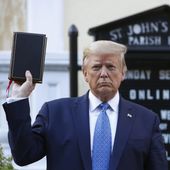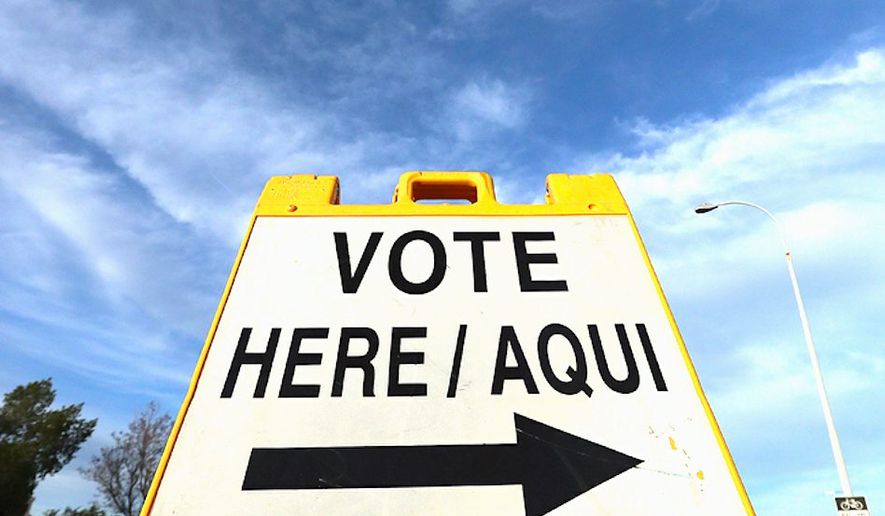NEWS AND OPINION:
A comprehensive new study reveals what many politicians already know: Hispanics are poised to become the major force in the voting booth. The potential surge could be of particular interest to President Trump, who has just received a vow of support from a large group of Hispanic pastors, even as a new NPR/PBS NewsHour/Marist poll reveals that 50 percent of Hispanics now approve of the job Mr. Trump is doing, up 19 percentage points since December.
“While demographic changes unfold slowly, it’s already clear that the 2020 electorate will be unique in several ways. Nonwhites will account for a third of eligible voters — their largest share ever — driven by long-term increases among certain groups, especially Hispanics,” write Anthony Cilluffo and Richard Fry, both analysts for the Pew Research Center.
“We project that the 2020 election will mark the first time that Hispanics will be the largest racial or ethnic minority group in the electorate, accounting for just over 13 percent of eligible voters — slightly more than blacks. This change reflects the gradual but continuous growth in the Hispanic share of eligible voters, up from 9 percent in the 2008 presidential election and 7 percent in the 2000 election. The black eligible voter population has grown about as fast as the electorate overall, meaning their share has held constant at about 12 percent since 2000,” said the analysts, who based their research on Census Bureau data.
This translates into a projected 32 million Hispanics and 30 million blacks who will be eligible to vote in 2020 — along with 11 million Asians, which is more than double the 5 million who were eligible to vote 20 years ago.
Thanks to immigration and naturalization patterns, 1-in-10 eligible voters in the 2020 election will have been born outside the U.S., the highest share since at least 1970. Turn out is also key in 2020; the analysts noted that “blacks are substantially more likely than Hispanics to vote.”
Meanwhile, 28 percent of eligible voters are baby boomers born between 1946 and 1964; 27 percent are millennials (born 1981-96); 25 percent are Gen Xers (born 1965-80); 10 percent belong to Generation Z (born after 1996); and 9 percent, the silent generation, were born before 1946.
Variables such as motivation, engagement and assorted emotional reactions will come into play — a challenge to strategists on both sides of the aisle.
“Since older adults are more likely to turn out to vote, it’s possible that older generations will form a larger share of actual voters in 2020 than their share in the electorate. That’s what happened in 2016: Even though boomers and older generations accounted for 43 percent of eligible voters, they cast 49 percent of the ballots,” the analysis said.
HOWARD HAS A SAY
Former Starbucks CEO Howard Schultz pines to run for president in 2020 as an independent, a notion that has rattled Democrats who fear he will split the vote and bring President Trump another win.
“I think the Democrats need a little bit less caffeine right now. I think they’ve over-rotated completely, because it’s very possible that if I run for president as a centrist independent, that more lifelong Republicans will come my way than Democrats. So I think the whole thing is just an overreaction. Let it all play out. Let people get to know me, and let the story get out,” Mr. Schultz told Fox News anchor Dana Perino.
He also dismisses the possibility of a split vote.
“It is a very strong possibility that more lifelong Republicans — who will have no place to go if there is a left-leaning, liberal progressive Democrat — they will vote for Donald Trump. It’s very possible if they had a better choice, someone in the middle who can speak to their values, they would vote for someone like me,” Mr. Schultz said.
“But I think the real question is, what kind of country do we want to live in? We want to live in a country that is so far to the left and that is moving toward socialism? Or a country in which the people the American people no longer trust the leaders in government, no longer have any respect for someone in the Oval Office? Or is there a better opportunity?” he said.
IMPEACHMENT FEVER WANES
A tiny tweet from ABC News this week reveals the public’s evolving attitude about the impeachment of President Trump. The brief comment on a new poll from the network and The Washington Post speaks for itself:
“40 percent support Congress beginning impeachment proceedings against Pres. Trump, @ABC News/WaPo poll finds, down nine points from August; 55 percent are opposed.”
The survey of 1,001 U.S. adults was conducted Jan. 21-24.
GOWDY TO FOX NEWS
Fox News has signed former South Carolina Republican Rep. Trey Gowdy as a contributor to offer “political and legal analysis” at Fox News Channel and Fox Business Network.
“During his time in Congress, Rep. Gowdy played a significant role in the congressional investigation of then-Secretary of State Hillary Clinton and the terrorist attacks in Benghazi,” Fox News noted in their announcement Wednesday.
Mr. Gowdy was elected in 2010 and served four terms in office, notably as chairman of the House Oversight and Government Reform Committee and as a member of the House Intelligence and Judiciary committees. Mr. Gowdy was chairman of the House Select Committee on the 2012 attack in Benghazi, Libya.
He also worked as a federal prosecutor, and as the 7th Circuit Solicitor, later established initiatives including a Violence Against Women Task Force and the Drug Mother Protocol to help expectant mothers with addiction.
Mr. Gowdy practices law as a member of Nelson Mullins Riley & Scarborough in Columbia, South Carolina, where he focuses on internal and government investigations and corporate compliance, the network said.
POLL DU JOUR
• 44 percent of registered Democratic voters say they will vote for the 2020 Democratic presidential candidate with “the best chance of defeating President Trump“; 46 percent of liberal Democrats, 47 percent of moderate Democrats and 32 percent of conservative Democrats agree.
• 24 percent of Democratic voters say they will choose the candidate who “shares my values”; 24 percent of liberal Democrats, 25 percent of moderate Democrats and 36 percent of conservative Democrats agree.
• 21 percent will pick the candidate who “shares my preferred policy positions”; 24 percent of liberal Democrats, 16 percent of moderate Democrats and 20 percent of conservative Democrats agree.
• 10 percent either don’t know, have no opinion or cite some another influence for their vote; 6 percent of liberal Democrats, 12 percent of moderate Democrats and 12 percent of conservative Democrats agree.
Source: A Politico/Morning Consults survey of 1,997 registered U.S. voters conducted Jan. 25-27; the sample included 686 Democrats.
• Kindly follow Jennifer Harper on Twitter @HarperBulletin
• Jennifer Harper can be reached at jharper@washingtontimes.com.




Please read our comment policy before commenting.